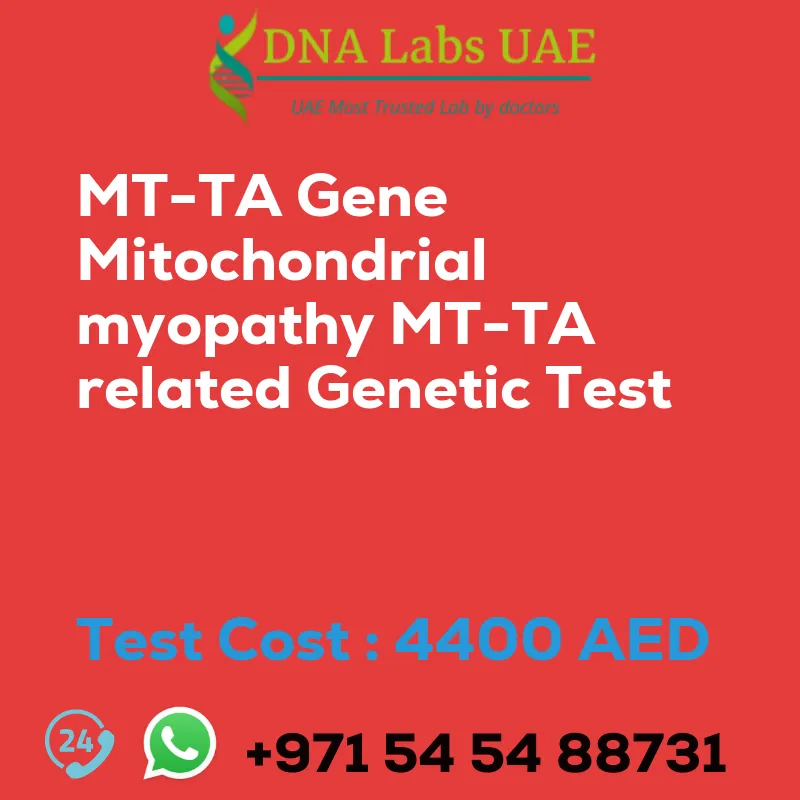MT-TA Gene Mitochondrial Myopathy Genetic Test
Test Name: MT-TA Gene Mitochondrial Myopathy MT-TA related Genetic Test
Components: Blood or Extracted DNA or One drop Blood on FTA Card
Price: 4400.0 AED
Report Delivery: 3 to 4 Weeks
Method: NGS Technology
Test Type: Cardiovascular Pneumology Disorders
Doctor: Cardiologist
Test Department: Genetics
Pre Test Information: Clinical History of Patient who is going for MT-TA Gene Mitochondrial Myopathy, MT-TA related NGS Genetic DNA Test. A Genetic Counselling session to draw a pedigree chart of family members affected with MT-TA Gene Mitochondrial Myopathy, MT-TA related NGS Genetic DNA Test gene MT-TA
Test Details
MT-TA gene mitochondrial myopathy is a rare genetic disorder characterized by muscle weakness and wasting. It is caused by mutations in the MT-TA gene, which is located in the mitochondrial DNA.
NGS (Next-Generation Sequencing) genetic testing is a type of genetic testing that uses advanced sequencing technologies to analyze multiple genes simultaneously. In the context of MT-TA gene mitochondrial myopathy, NGS genetic testing can be used to identify mutations in the MT-TA gene that may be responsible for the disorder.
NGS genetic testing typically involves obtaining a DNA sample from the individual undergoing testing, which can be done through a blood sample or a cheek swab. The DNA sample is then sequenced using NGS technology, and the resulting data is analyzed to identify any mutations or variations in the MT-TA gene.
The results of the NGS genetic test can help confirm a diagnosis of MT-TA gene mitochondrial myopathy and provide information about the specific genetic mutation involved. This information can be useful for genetic counseling, family planning, and potentially for guiding treatment decisions in the future.
It is important to note that genetic testing for MT-TA gene mitochondrial myopathy is typically ordered by a healthcare professional with expertise in genetics. The results of the test should be interpreted in the context of the individual’s clinical symptoms and family history. Genetic counseling is often recommended both before and after genetic testing to ensure a thorough understanding of the implications and limitations of the test results.
| Test Name | MT-TA Gene Mitochondrial myopathy MT-TA related Genetic Test |
|---|---|
| Components | |
| Price | 4400.0 AED |
| Sample Condition | Blood or Extracted DNA or One drop Blood on FTA Card |
| Report Delivery | 3 to 4 Weeks |
| Method | NGS Technology |
| Test type | Cardiovascular Pneumology Disorders |
| Doctor | Cardiologist |
| Test Department: | Genetics |
| Pre Test Information | Clinical History of Patient who is going for MT-TA Gene Mitochondrial myopathy, MT-TA related NGS Genetic DNA Test. A Genetic Counselling session to draw a pedigree chart of family members affected with MT-TA Gene Mitochondrial myopathy, MT-TA related NGS Genetic DNA Test gene MT-TA |
| Test Details |
MT-TA gene mitochondrial myopathy is a rare genetic disorder characterized by muscle weakness and wasting. It is caused by mutations in the MT-TA gene, which is located in the mitochondrial DNA. NGS (Next-Generation Sequencing) genetic testing is a type of genetic testing that uses advanced sequencing technologies to analyze multiple genes simultaneously. In the context of MT-TA gene mitochondrial myopathy, NGS genetic testing can be used to identify mutations in the MT-TA gene that may be responsible for the disorder. NGS genetic testing typically involves obtaining a DNA sample from the individual undergoing testing, which can be done through a blood sample or a cheek swab. The DNA sample is then sequenced using NGS technology, and the resulting data is analyzed to identify any mutations or variations in the MT-TA gene. The results of the NGS genetic test can help confirm a diagnosis of MT-TA gene mitochondrial myopathy and provide information about the specific genetic mutation involved. This information can be useful for genetic counseling, family planning, and potentially for guiding treatment decisions in the future. It is important to note that genetic testing for MT-TA gene mitochondrial myopathy is typically ordered by a healthcare professional with expertise in genetics. The results of the test should be interpreted in the context of the individual’s clinical symptoms and family history. Genetic counseling is often recommended both before and after genetic testing to ensure a thorough understanding of the implications and limitations of the test results. |








